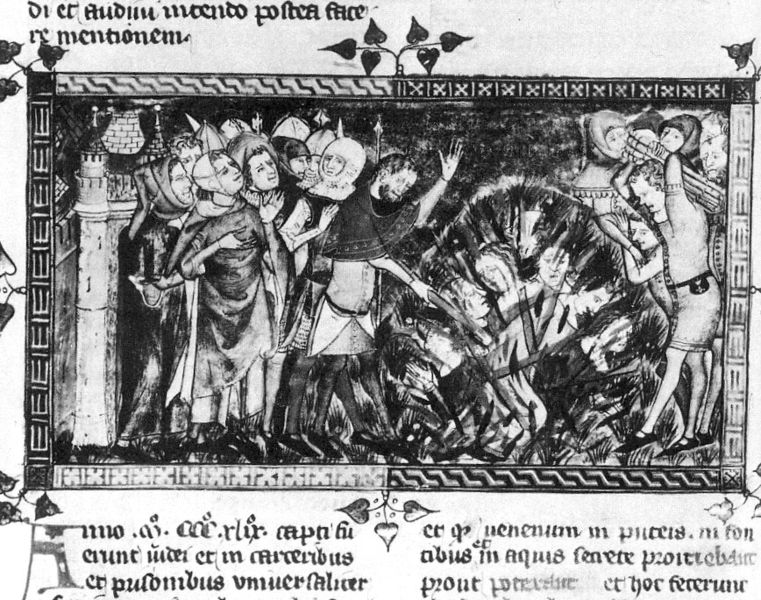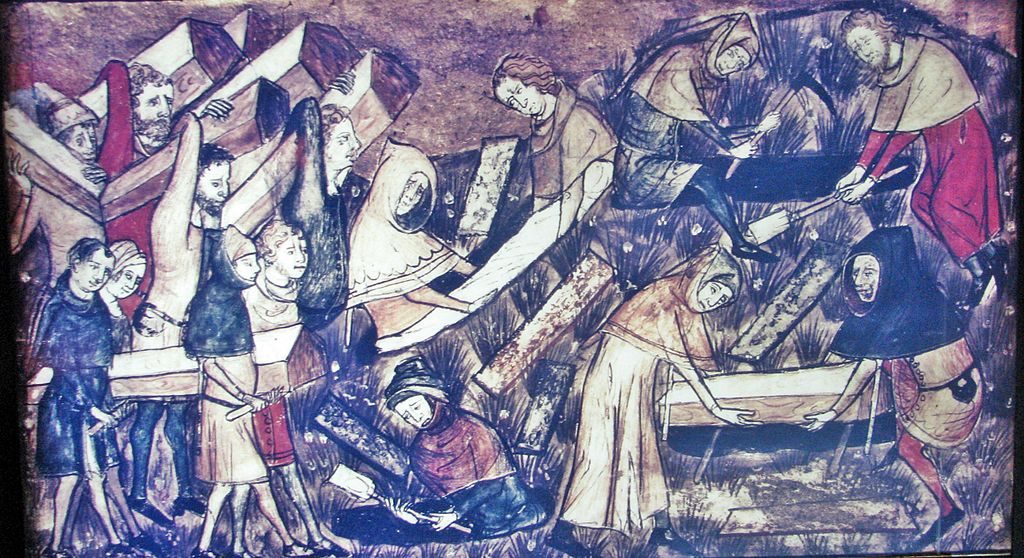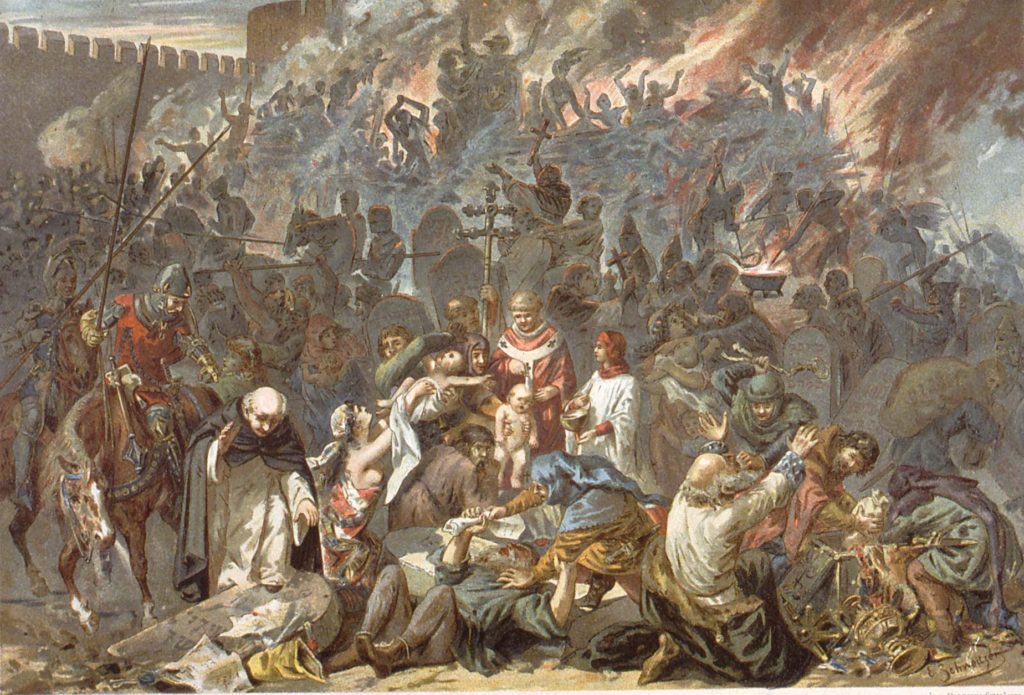
1330 AD to 1350 AD, Psalm 114: The Black Death.
This site was first built in French (see www.147thgeneration.net). The English translation was mainly done using « google translation ». We have tried to correct the result of this translation to avoid interpretation errors. However, it is likely that there are unsatisfactory translations, do not hesitate to communicate them to us for correction.
(for that click on this paragraph)
Summary
This generation of the 1330s and 1340s.
According to our count, this generation is the 114th generation associated with Psalm 114. It is in this Psalm 114 that we therefore find an illustration of the facts of this generation.
The fourteenth century that breaks with the growth generations of the nascent West confirms this break with the present generation. This generation is marked by the Black Death, a scourge that adds to the Hundred Years War, linked to the succession of the French throne, a war that officially also engages this generation.
The Black Death resulted in a new massacre of German Jews in communities that had already suffered the first attacks during the first crusade in 1096. Communities that each time have barely time to rebuild before undergoing new popular attacks.
The Black Death strikes indiscriminately believers of every religion, Christian or Jewish, proves doubly tragic for Jews undergoing, in addition to direct effects of the epidemic, reactions again irrational from Christian populations. This new massacre has the effect of confirming a migration movement of Jewish communities to the east.
Thus the Jewish people begin a new phase of their exile, even further. In the Bible, a particular symbolism is associated with exile. This is still used in the psalm of this generation, in terms that characterize well the new frontiers reached by the Jewish people in this generation.
Talk
Black Plague
The fourteenth century that breaks with the growth generations of the nascent West confirms this break with the present generation. This generation is marked by the Black Death, a scourge that adds to the Hundred Years War, linked to the succession of the French throne, a war that officially also engages this generation.
The Black Death resulted in a new massacre of German Jews in communities that had already suffered the first attacks during the first crusade in 1096. Communities that each time have barely time to rebuild before undergoing new popular attacks.


The Black Death strikes indiscriminately believers of every religion, Christian or Jewish, proves doubly tragic for Jews undergoing, in addition to direct effects of the epidemic, reactions again irrational from Christian populations. This new massacre has the effect of confirming a migration movement of Jewish communities to the east.
Thus the Jewish people begin a new phase of their exile.
During the first exiles, the Jews found themselves in the bordering lands of the land of Israel, then they took the path around the Mediterranean. They then began to sink into Europe but to this generation it is a new phase of the exile that is beginning, the Jews go further and further and settle in the ends of Europe to the East, far from the land of Israel.
The symbolism of exile
The ancient prophets paralleled the harshness of exile with the power of the covenant God made with the Jewish people when they left Egypt. So says Micah:
- Hear now [1] what the Lord says; Rise; contend with the mountains, and may the hills hear My voice.
- Hear ye, O mountains, the controversy of the Lord; and you mighty ones, the foundations of the earth; for the Lord has a controversy with His people, and with Israel He shall contend.
- My people, what have I done, and how have I wearied you? Testify against Me.
- For I brought you up out of the land of Egypt and redeemed you from the house of slavery, and I sent before you Moses, Aaron, and Miriam.
This is why, in this new phase of exile, the psalmist begins the psalm of this generation, also recalling the alliance concluded:

- When Israel left Egypt, the house of Jacob [left] a people of a strange tongue,
- Judah became His holy nation, Israel His dominion.
But this installation of the people of Israel in the promised land did not last because of the many faults of this one. So the same prophets when they announce the next exile evoke mountains and valleys to materialize this one. This is particularly the case of Isaiah:
- Therefore [2], My people shall go into exile […]
- Therefore, the Lord has become wroth with His people, and He has stretched forth His hand upon them and has struck them, and the mountains have quaked, and their corpses were like spittle in the midst of the streets; with all this, His anger has not turned back, and His hand is still outstretched.
- And He shall raise an ensign to the nations from afar, and He shall whistle to him from the end of the earth, and behold, quickly, swiftly he shall come.
And more markedly with Habakkuk:
- He (God) stood [3] and meted out to the earth; He saw and caused nations to wander. And the everlasting mountains were shattered; the everlasting hills were humbled. The procedures of the world are His.
This is even more symbolic in Micah than we have already quoted. In the first exile of the tribes of Israel in Samaria, Micah had symbolically represented this one by the mountains and valleys of Israel, which are giving way to other places to welcome the people of Israel:
- The word of the Lord [4] that came to Micah the Morashtite in the days of Jotham, Ahaz, [and] Hezekiah, the kings of Judah, which he prophesied concerning Samaria and Jerusalem.
- Hear, all you peoples; hearken, O land and the fullness thereof, and let the Lord God be a witness against you; the Lord from His Holy Temple.
- For behold, the Lord comes forth from His place, and He shall descend and tread upon the high places of the earth.
- And the mountains shall melt under Him, and the valleys shall split-as wax before fire, as water poured down a steep place.
- All this is because of the transgression of Jacob, and because of the sins of the house of Israel. Who is [the cause of] the transgression of Jacob? Is it not Samaria? And who [is the cause of] the high places of Judah? Is it not Jerusalem?
You mountains, that you dance like rams ?
But in the time of Micah, exile was both short (at least for Judah) and not far away, but in the case of our generation, this one drags on and especially approaches regions more and more distant:
- The major phenomenon [5] of this period (fourteenth to eighteenth century) remains the mass migration of Jews to Poland and, in the sixteenth century to Lithuania, following the expulsions of Germany. This influx of Jewish population to the east promotes the development of a community that will become the largest in the European world.
The Black Death amplifies a phenomenon that was already initialized at the first evictions in Europe and will continue thereafter, especially after the expulsions from Spain and Portugal in the late fifteenth century.
So if Micah spoke of « mountains shall melt under Him, and the valleys shall split-as wax before fire » for the first exiles of the Jewish people, for the generation that interests us, Poland and the lands of the east represent for the Jewish people normally anchored in the land of Israel almost another galaxy, and in any case the end of the world.
This explains the allegory of the psalmist who for the psalm of this generation takes over the symbolism of Micah amplifying to adapt to this new land of exile.
So, in the time of Micah, the mountains were liquefied, to this generation they « dance like rams ». And the Jordan that symbolizes the land of Israel is dramatically « turned backward » from its people.
This is what the psalmist expresses in the following of the psalm of this generation:

- The sea saw and fled; the Jordan turned backward.
- The mountains danced like rams, hills like young sheep.
- What frightens you, O sea, that you flee? O Jordan, that you turn backward?
- You mountains, that you dance like rams; you hills, like young sheep?
Micah foresees the fate that the people will reserve for the people of Israel during their exile:
- And now [6], many nations shall gather upon you who say, « Let her be guilty, and our eyes shall gaze on Zion. »
- But they did not know the thoughts of the Lord; neither did they understand His counsel, for He gathered them as sheaves to a threshing floor.
Thus, despite the apparent fragility of the Jewish people within nations, God does not abandon him. The Jewish people, despite this seeming submission, continue to play their role as Micah says:
- And the remnant [7] of Jacob shall be in the midst of many peoples-like dew sent by the Lord, like torrents of rain upon vegatation that does not hope for any man and does not wait for the sons of men.
At the end of time, so God will come to gather his people from the bosom of the nations, whatever their dispersion in a world more and more vast, as Isaiah recalls.
Thus, in spite of the ever greater distance of the waters and springs of the land of Israel, it is in God that the people of Israel find their drink. This spiritual source is also materialized by the Jewish mysticism incarnated by the Zohar who does not fail to accompany the Jews in their new peregrinations:
- While [8] displaying a deep respect for rabbinical Judaism and attaching a mystical meaning to any religious practice, the Zohar, with innocent airs, seeks to diminish the authority of the Talmud. According to him, it is much more important to study Kabbalah than the Talmud, because the first gives rise to thought and allows it to penetrate all the mysteries of creation, while the study of the Talmud removes the intelligence all insight and depth. To study the Talmud, says the Zohar again, is to use his forces painfully against a very hard rock, which, after bitter labors and numerous blows (allusion to the rock which Moses struck), will let out a few rare drops of water; Cabal, on the other hand, is a springing source, to which it suffices to say a word in order to obtain in abundance a limpid and vivifying water. Finally, for the Zohar, the Talmud is a vile slave and the Cabal a marvelous princess.
Thus the end of the psalm of this generation recalls the faith of the people of Israel in their God and in the covenant with their God which enables them to hope for a future redemption. Hope of redemption which, despite the increasingly pronounced temporal and geographical remoteness of the promised land, like a miraculous source, allows it to survive between nations:

- From before the Master, Who created the earth, from before the God of Jacob,
- Who transforms the rock into a pond of water, the flint into a fountain of water.

[1] Michah – Micah – Chapter 6, verses 1 to 4.
[2] Yeshayahu – Isaiah – Chapter 5, first part of verses 13 and verses 25 and 26.
[3] Chavakuk – Habakkuk – Chapter 3, verse 6
[4] Michah – Micah – Chapter 1, verses 1 to 5
[5] (directed by) Jean Baumgarten: « A thousand years of Ashkenazi cultures ». Chapter II: « The development of Ashkenaz at the threshold of modernity ». (French: « Mille ans de cultures ashkénazes ». Chapitre II : « De l’épanouissement d’Ashkenaz au seuil de la modernité ». (p. 59) ).
[6] Michah – Micah – Chapter 4, verses 11 and 12
[7] Michah – Micah – Chapter 5, verse 6.
[8] Henri Graetz : « HISTOIRE DES JUIFS / TROISIÈME PÉRIODE — LA DISPERSION ». Deuxième époque — La science et la poésie juive à leur apogée. Chapitre dix — Progrès de la bigoterie et de la Cabale (1270-1325). (Extrait du site web : «histoiredesjuifs.com »)
